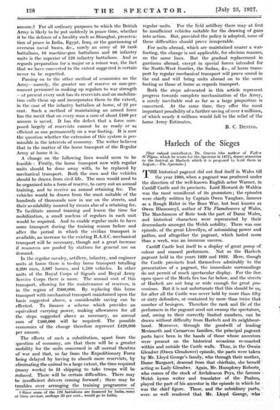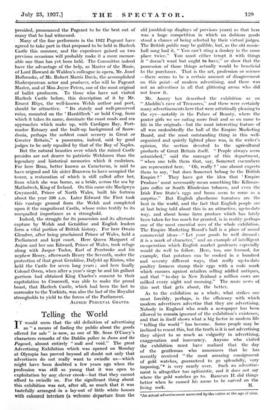Harlech of the Sieges
[Our valued contributor, Dr. Graves (the author of Fallvir 0' Flynn, which he wrote for the Spectator in 1872), draws attention to the festival which it is proposed to hold there in August.—En. THE historical pageant did not find itself in Wales till the year 1909, when a pageant was produced under the direction of the well-known English actor Warner, in Cardiff Castle and its precincts. Lord Howard de Walden was the most munificent of its promoters ; the episodes were chiefly written by Captain Owen Vaughan, famous as a Rough Rider in the Boer War, but best known as Owen Rhosoomyl, author of The Flamebearers of Wales. The Marchioness of Bute took the part of Dame Wales, and historical characters were represented by their descendants amongst the Welsh nobility. There was one episode, of the great Llewellyn, of astonishing power and pathos, and altogether the pageant, which lasted more than a week, was an immense success.
Cardiff Castle lent itself to a display of great pomp of colour and massed performers. Not so the Harlech pageant held in the years 1920 and 1922. Here, though the Castle precincts lend themselves admirably to the presentation of a pageant, the immediate surroundings do not permit of much spectacular display. For the fine open space of the Morfa lies too far below, and the streets of Harlech are not long or wide enough for great pro- cessions. But it is not unfortunate that this should be so, • for after all the Castle was never held by more than fifty or sixty defenders, or contained by more than twice that number of besiegers. Therefore the rank and file of the performers in the pageant need not swamp the spectators, and, owing to their correctly limited numbers, can be drawn without difficulty from Harlech and its neighbour- hood. Moreover, through the goodwill of leading: Merioneth and Carnarvon families, the principal pageant parts have been in the hands of those whose ancestors were present on the historical occasions re-enacted within and outside the Castle walls. Thus, in the Owain Glendwr (Owen -Glendower) episode, the parts were taken by Mr. Lloyd George's family, who through their mother, _ Dame Margaret, descend from that chieftain, she herself:" acting as Lady Glendwr. Again, Mr. Humphrey Roberts, who comes of the stock of Archdeacon Prys, the famous - Welsh hymn writer and translator of the Psalms, played the part of his -ancestor in the episode in which he was the chief figure. These, and the subsidiary parts, were- so -well rendered that Mr. Lloyd -George, who presided, pronounced the Pageant to be the best out of many that he had witnessed.
Many of the fine performers in the 1922 Pageant have agreed to take part in that proposed to be held in Harlech Castle this stmuner, and the experience gained on two previous occasions will probably make it a more memor- able one than has yet been held. The Committee indeed have the advantage of the help, as Master of the Music, of Lord Howard de Walden's colleague in opera, Mr. Josef Holbrooke, of Mr. Robert Marris Davis, the accomplished Shakespearean actor and producer, who will be Pageant Master, and of Miss Joyce Peters, one of the most original of ballet producers. To those who have not visited Harlech. Castle before, this description of it by Mr. Ernest Rhys, the well-known Welsh author and poet, should be attractive. " Its stately and well-preserved ruins, mounted on the Harddlleeh ' or bold Crag, from which it takes its name, dominate the coast roads and sea approaches which make up, with Cardigan Bay, Port- madoc Estuary and the built-up background of Snow- donia, perhaps the noblest coast scenery in Great or Greater Britain," a panorama, indeed, said by good judges to be only equalled by that of the Bay of Naples.
But the natural beauties over which the ruined Castle presides are not dearer to patriotic Welshmen than the legendary and historical memories which it enshrines. For here Bran, better known as Caractacus, is said to have reigned and his sister Branwen to have occupied the tower, a restoration of which is still called after her, from which she was borne, as a bride, across the sea by Matholwch, King of Ireland. On this same site Maelgwyn Gwyiinedd, Prince of North Wales, built his fortress about the year 530 A.D. Later Edward the First took this vantage ground from the Welsh arid completed upon it the magnificent Castle, whose ruins testify to its unequalled importance as a stronghold.
Indeed, the struggle for its possession and its alternate capture by Welsh and Geraldine and English leaders iorm a vital portion of British history. For here °wain. Glendwr, after being proclaimed Prince of Wales, held a Parliament and kept court. Here Queen Margaret of Anjou and her son Edward, Prince of Wales, took refuge along with Jasper Tudor, Earl of Pembroke and his nephew Henry, afterwards Henry the Seventh, under the protection of that great Geraldine, Dafydd ap Einion, who held the Castle for seven long years ; and here finally Colonel Owen, when after a year's siege he and his gallant garrison had obtained King Charles's consent to their capitulation to Cromwell, was able to make the proud boast, that Harlech Castle, which had been the last to surrender to the Yorkists, was also the last of the Royalist strongholds to yield to the forces of the Parliament.
ALFRED PERCEVAL GRAVES.























































 Previous page
Previous page